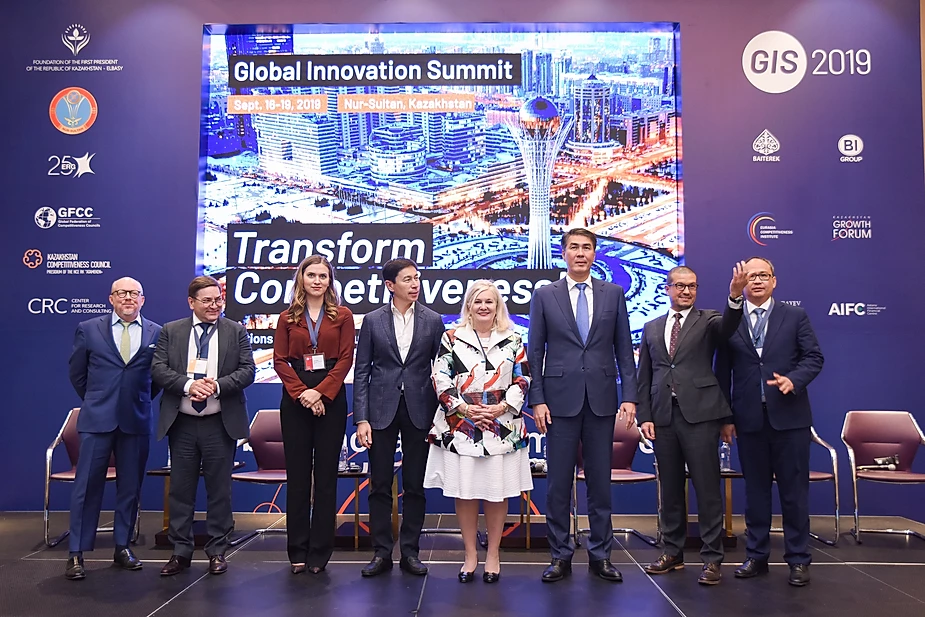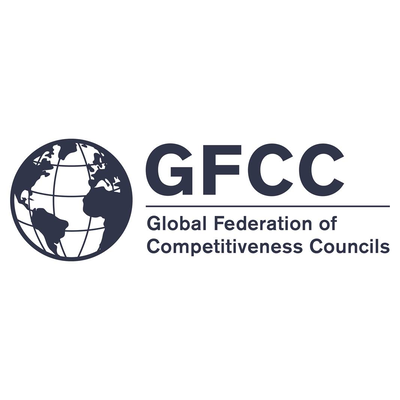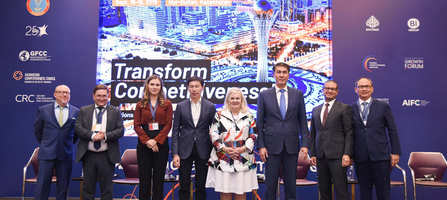
News
Highlights from the 2019 Global Innovation Summit
September 20, 2019


sources
share
article
references
https://www.thegfcc.org/post/highlights-from-the-2019-global-innovation-summitThe GFCC was pleased to welcome His Excellency Alikhan Smailov, Deputy Prime Minister of Kazakhstan; His Excellence Altay Kulginov, Mayor of Nur-Sultan; and His Excellency Asset Issekeshev, Executive Director of the Foundation of the First President of Kazakhstan to the official welcome ceremony and opening of the 2019 Global Innovation Summit. Their opening remarks laid the foundation for the discussions of GIS2019, highlighting the unique period of transformation affecting global competitiveness across industry, academia and government with a particular emphasis on the regional context of the country.
The culmination of the first full day of the Global Innovation Summit was the launch of the 2019 edition of the GFCC's Principles and Best Practices. The Global Competitiveness Principles offer an overarching framework for national strategies and programs aimed at fostering innovation, competitiveness and prosperity in the 21st century economy. This year’s edition focuses on action-oriented solutions to transform competitiveness across the globe. In this edition of the Best Practices report, we highlight examples from GFCC members in Ecuador, Kazakhstan, Qatar, and the United States.
We are living in an era of accelerated change, in which the economic landscape and society as we know them are being challenged. Exponentially growing technologies are re-shaping the way we work, businesses operate and compete, nations are governed and societies function.
Professionals, businesses, cities and nations are increasingly being called to navigate this changing reality and take action. Our first Transformation Spotlight presentation from Dr. Margareta Drzeniek Hanouz, GFCC Senior Fellow and Managing Partner of Horizon Group, highlighted how the changing talent landscape is changing the way we produce, sell and consume goods and services.
Our first panel discussion addressed the holistic approaches of contemporary national transformation agendas that tend to connect societal issues (health, education, security, sustainability etc.) with talent development, innovation, internationalization and industrial sophistication and diversification. Moderated by the Chairman of the Kazakhstan Competitiveness Council, Mr. Eldar Abdrazakov, our panel of experts, including Mr. Simos Anastasopoulos, President of CompeteGR; Professor Miguel Marques Vice-Rector of Catholic University Portugal; Dr. Agris Preimanis, Director, Head of Kazakhstan at the EBRD; Tan Sri Dr. Ir. Ahmad Tajuddin Ali, Joint Chairman of MIGHT; and H.E. Askhat Orazbek, Vice-Minister of Digital Development, Innovation and Aerospace Industry, discussed nations at the cutting edges of transformation strategies, and what the barriers and enablers of successful national transformation have been.
This discussion on the key challenges faced by nations transitioned into our next Transformation Spotlight topic - energy. Mr. William "Bill" Lese of Braemar Energy Ventures gave us a snapshot of the implications of a global energy transition and its affect on efforts to implement climate change policies and strategies to help mitigate the increasingly catastrophic effects of global warming. Energy remained the focal point of the conversation through our second panel discussion Bridging Energy Supply with Future Sustainability. The Hon. Robert Barbour (Director and Chief Executive, Centre for Competitiveness, and CEO, The Smart Grid Ireland Electricity Cluster) discussed the role advanced technologies like smart power grids play in creating opportunities for the greenification of energy matrices. He was joined by Mr. Arman Kashkinbekov, CEO, Association of Renewable Energy of Kazakhstan; Mr. William “Bill” H. Bohnett President, Whitecap Investments LLC; and Dr. Mohammad Zaidi, Strategic Advisory Board Member, Braemar Energy Ventures for this panel moderated by GFCC Chairman Mr. Charles O. Holliday Jr.
The afternoon began with a focus on transformation in industries. With the accelerated innovation of new technologies and the increased use of connectivity in the production process, most industries have experienced a drastic change. Advanced manufacturing and artificial intelligence are the future, but industrial sectors will face different paths forward. Following a Transformation Spotlight from Mr. Sanzhar Kettebekov of Satbayev University, Panel Moderator and GFCC Treasurer Mr. Chad Evans put forth the question of "how can industries and countries position themselves in their unique contexts to adapt to these changes?" to the panel of distinguished experts, including Professor Dr. Mohamed Ibrahim Abdul Mutalib, Vice Chancellor and CEO, Universiti Teknologi Petronas; Professor Mariam Al-Maadeed, Vice President for Research & Graduate Studies, Qatar University; Dr. Kairat Kelimbetov, Governor, Astana International Financial Centre; Mr. Adham Nadim, Chairman and Director, NADIM Industries; and Professor Peter G R Smith; Pro Vice-Chancellor, International Projects, University of Southampton.
H.E. Malika Bekturova, the Deputy Mayor of Nur-Sultan, opened our discussion on cities and mobility with her Transformation Spotlight presentation, examining the case study of Nur-Sultan and its quest to enhance its competitiveness and become a leading model for smart cities in the region. Deputy Mayor Bekturova also joined the following panel, moderated by GFCC Executive Director Roberto Alvarez, discussing the frameworks needed for sustainable urban infrastructures with Mr. Anuar Buranbayev (Partner, Center for Research and Consulting, LLP), The Hon. Jerry Hultin (Chair and Co-founder, Global Futures Group, LLC), Professor Jim Metson (Deputy-Vice Chancellor (Research), The University of Auckland), and Datuk Dr. Mohd Yusoff Sulaiman (President and CEO, MIGHT) .
Mr. Symeon Tsomokos of CompeteGR brought the scope of the conversation back to the national level with his Transformation Spotlight on the rebirth of Greece, and the nation's efforts to scale up its innovation and competitiveness following economic crisis. His forward looking perspective on the future of transformation was emphasized by our final Transformation Spotlight on Innovation Futures from Mr. Taddy Hall (Senior Partner, Lippincott). Competitiveness is not static. Being competitive today does not guarantee future competitiveness for companies, regions or nations. In fact, history has shown us that organizations and nations go up and down. Competitiveness is a never-ending race and agendas have to be always evolving. GFCC President Deborah Wince-Smith moderated our final panel discussion that tackled this question of what is the future of competitiveness? Mr. Alexander Idrisov (Co-Founder, Eurasia Competitiveness Institute), H.E. Asset Issekeshev (Elbasy), The Hon. Dr. Jan Mládek (Director, The Czech Institute of Applied Economics, Ltd.), Dr. Michiharu Nakamura (Senior Advisor & Former President, Japan Science and Technology Agency), and Dr. Saif Al-Hiddabi (Assistant Secretary General for Research & Scientific Programs, The Research Council Oman), joined Ms. Wince-Smith to debate the future frontiers of competitiveness.
The first day of the 2019 Global Innovation Summit culminated in our annual Gala Dinner, with cultural performances arranged by our distinguished Kazakh hosts - the Kazakhstan Competitiveness Council and the Center for Research and Consulting. At the Gala Dinner, H.E. Asset Issekeshev was presented with the 2019 Global Competitiveness Award for his work in both the public and private sectors, advancing talent development and innovation capacity in Kazakhstan.
Day 2 was defined by a series of interactive conversations on transformation in nations, industries, and cities, as well as a special Eurasia Competitiveness Dialogue on the opportunities of the 4th industrial revolution. These conversations were opportunities for GIS participant to engage with one another and take part in meaningful efforts to suggest initiatives and effort to address the challenges of the 21st century and take advantage of the transformation opportunities laid out in the previous days discussions.
The 2019 Global Innovation Summit brought together 250+ participants from over 15 different countries, representing every major sector of the economy, from business to academia. We extend our particular gratitude to our hosts, the Kazakhstan Competitiveness Council and the Center for Research and Consulting, as well as the GFCC member community as a whole.
share
article
references
https://www.thegfcc.org/post/highlights-from-the-2019-global-innovation-summitall publications











